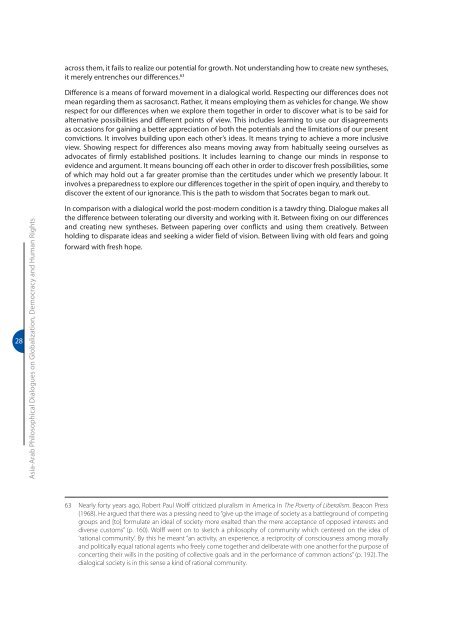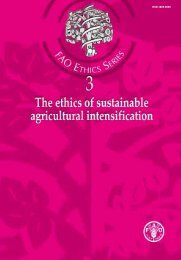Asian-Arab philosophical dialogues on globalization, democracy ...
Asian-Arab philosophical dialogues on globalization, democracy ...
Asian-Arab philosophical dialogues on globalization, democracy ...
Create successful ePaper yourself
Turn your PDF publications into a flip-book with our unique Google optimized e-Paper software.
across them, it fails to realize our potential for growth. Not understanding how to create new syntheses,<br />
it merely entrenches our differences. 63<br />
Difference is a means of forward movement in a dialogical world. Respecting our differences does not<br />
mean regarding them as sacrosanct. Rather, it means employing them as vehicles for change. We show<br />
respect for our differences when we explore them together in order to discover what is to be said for<br />
alternative possibilities and different points of view. This includes learning to use our disagreements<br />
as occasi<strong>on</strong>s for gaining a better appreciati<strong>on</strong> of both the potentials and the limitati<strong>on</strong>s of our present<br />
c<strong>on</strong>victi<strong>on</strong>s. It involves building up<strong>on</strong> each other’s ideas. It means trying to achieve a more inclusive<br />
view. Showing respect for differences also means moving away from habitually seeing ourselves as<br />
advocates of firmly established positi<strong>on</strong>s. It includes learning to change our minds in resp<strong>on</strong>se to<br />
evidence and argument. It means bouncing off each other in order to discover fresh possibilities, some<br />
of which may hold out a far greater promise than the certitudes under which we presently labour. It<br />
involves a preparedness to explore our differences together in the spirit of open inquiry, and thereby to<br />
discover the extent of our ignorance. This is the path to wisdom that Socrates began to mark out.<br />
28<br />
Asia-<str<strong>on</strong>g>Arab</str<strong>on</strong>g> Philosophical Dialogues <strong>on</strong> Globalizati<strong>on</strong>, Democracy and Human Rights<br />
In comparis<strong>on</strong> with a dialogical world the post-modern c<strong>on</strong>diti<strong>on</strong> is a tawdry thing. Dialogue makes all<br />
the difference between tolerating our diversity and working with it. Between fixing <strong>on</strong> our differences<br />
and creating new syntheses. Between papering over c<strong>on</strong>flicts and using them creatively. Between<br />
holding to disparate ideas and seeking a wider field of visi<strong>on</strong>. Between living with old fears and going<br />
forward with fresh hope.<br />
63 Nearly forty years ago, Robert Paul Wolff criticized pluralism in America in The Poverty of Liberalism. Beac<strong>on</strong> Press<br />
(1968). He argued that there was a pressing need to “give up the image of society as a battleground of competing<br />
groups and [to] formulate an ideal of society more exalted than the mere acceptance of opposed interests and<br />
diverse customs” (p. 160). Wolff went <strong>on</strong> to sketch a philosophy of community which centered <strong>on</strong> the idea of<br />
‘rati<strong>on</strong>al community’. By this he meant “an activity, an experience, a reciprocity of c<strong>on</strong>sciousness am<strong>on</strong>g morally<br />
and politically equal rati<strong>on</strong>al agents who freely come together and deliberate with <strong>on</strong>e another for the purpose of<br />
c<strong>on</strong>certing their wills in the positing of collective goals and in the performance of comm<strong>on</strong> acti<strong>on</strong>s” (p. 192). The<br />
dialogical society is in this sense a kind of rati<strong>on</strong>al community.

















